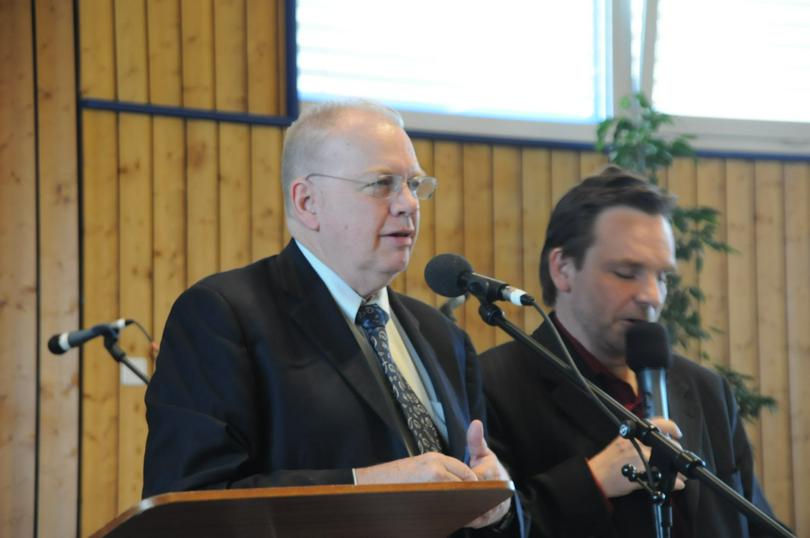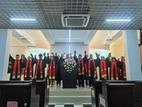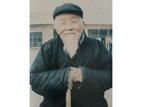"I have a dream that our Chinese church should turn into the church in Acts. This is called revival, not merely done with many people or many being baptized. It means that we should recover to the church in the time of Acts." Rev. Dennis Balcombe (widely named Bao De-ning in China) said in the opening ceremony of 2016 Chinese and Korean Revival Conference held on Jeju, Korea, on September 26.
Born in California, the white pastor says he was born for China and his fellow workers who have been cooperating with him for years claim that he has a Chinese heart. He confirmed God's calling at 16 and went to Hong Kong to learn Chinese in 1969. He has visited China for several times since 1978 and witnessed the revival in Chinese house church in the past decades, ministering them in the process.
Recently the Christians Times(基督时报), a Christian online newspaper in Mainland China, interviewed Rev. Dennis Balcombe to talk about his observation and reflection of the Chinese church. This article is a second part of the interview. (See the first part:[Interview] China Missionary Dennis Balcombe: Present Challenge, and the Revival of Chinese Church in the Past 30 Years)
Christian Times: Today the church in the world pays close attention to the Chinese church. Since you have been serving the Chinese church for decades, where do you think can the Chinese church make contributions to the world's church? What's the significance of the Chinese church to the development of Christianity across the world?
Rev. Dennis Balcombe: Now Chinese people are found all over the world for Chinese immigrate to, study or settle down in foreign countries. So the church in China must be concerned about those Chinese who goes abroad. Certain missionaries will come out of those immigrants.
What's more, the church is different from the previous decades. At present the Chinese church preaches the gospel to other countries while the latter evangelized China in the past. For example, Chinese missionaries have been sent to do ministry in the Middle East, South Asia and Southeast Asia. I know that many local churches who don't speak Chinese preach the gospel to Chinese, a large percentage of whom are intellectuals, professionals, workers and working in restaurants.
On the contrary, local Chinese churches don't feel the burden to reach Chines. I hold that the Chinese church should focus on overseas mission. Of course, there are also ethnic minorities in China and ministry is needed.As a result, the Chinese church need to carry out missions.
Christian Times: What else should the Chinese church prepare for missions?
Rev. Dennis Balcombe: It's quite normal to be immature for the Chinese church just begins missions. The Chinese church should also cooperate with many mature overseas organizations, for instance, there are a number of cross-cultural mission agencies in Southeast Asia. The Chinese church should join hands with them because they have abundant experiences, who have missioned to many countries and cultures. So this is an aspect where Chinese should learn.
Since the Chinese church is in its infancy with a history of only more than two centuries, having large congregations while lacking methods, experience and funds, cooperation is needed. It's like the cooperation between Chinese and overseas enterprises.
Besides, it's good that Chinese attend overseas Bible colleges. If you have some English foundation, you can learn some languages like French and Germany, which will be helpful to your mission.
So I believe that the Chinese church needs to emphasize on the mission vitality at this phase.
Christian Times: What do you think is the characteristic of the Chinese church? What phase and challenge does it face now? How should it walk on this part of the road? What should it stick to and what should it change? Where should it be cautious?
Rev. Dennis Balcombe: She should insist on prayer, desiring God and the message of the cross. Today some western evangelists preach prosperity theology without including any message of the cross or sufferings, which is a destruction of the western church for decades. It talks only about success and blessings relevant to offerings, eventually asking you to donate money to preachers rather than preaching the message of suffering for the Lord and having a humble heart. So we should stick to what we have. Revelation states that you should regain your first love.
In this respect the Chinese church should hold fast to many things, like Canaan Hymns (a collection of hymns)mainly concerns commitment, evangelization, taking up the cross and martyrdom.
But this is just one part and you should teach other things. For example, the church moves from the countryside to the city, becoming a propertied class from a proletariat. Having uneducated believers in the past, now there are students, entrepreneurs and intellectuals. This is good. We ought to stick to what we have, which rests with pastors and leaders. If a pastor doesn't pray, how can the staff and congregation attach importance to prayer? If he doesn't value missions, how can people beneath him stress on missions?
Some people emphasize theological system and add philosophy like the teachings of Plato and Socrates to theology. Chinese are fond of these things, while they are unattractive to the West for we may be not so smart as Chinese. However, you will lose much if you only emphasize on the rational teachings and lose the zeal of prayer and evangelisation.
I have been to many churches who used to revive and desire the anointing of the Holy Spirit, but prayer and evangelism were gradually reduced when they accepted these things. Consequently, some churches were closed after one or two years and some had few believers. They were affected by many rational teachings flowed from other countries, many of whom experienced revival (before that).
What should it be cautious of? The church should be independent and free from the control of overseas. If they want to donate money for some projects, it's okay to buy books and run schools but don't receive donations for your own church's benefit.You must teach tithings to believers and rely on God by faith. The foreign church who is rich will hire you as a church co-worker and then give you living expenses to control you. What matters more than paying you is life, care and teachings. So refuse to the support for your work from others. Because this is conditional and you will be never on your own. You can only be dependent as long as you rely on yourself.
Chinese should have their own church. They should maintain self-governance, self-support and self-propagation whether in management or evangelisation. Don't let overseas church establish their own ministries in China. They can help you, for instance, help you learn prayer and give you the Bible. But they should not force you to be their team members.
The Chinese church also needs to stick to its culture. Koreans have their culture and so do Americans. The gospel must be spread in the way of local culture rather than other culture, otherwise, it will turn out to be a foreign religion.
In addition, be careful not to abandon all thing things from overseas. The Chinese church should participate in the world and attend abroad significant conferences or gatherings.And it should learn from and communicate with (other countries). The church should be international.
The western church also faces many problems and declines. When I was young, 80% of the people attended Sunday services while the percentage is less than 40% at present. What's worse, the percentage is around 10% in the Evangelical and Pentecostal church. Although there are many megachurches, they preach comfortable things, like not requiring repentance. They cater the believers. Therefore, we should be cautious to things from overseas.
Essentially, we should stick to pure faith. The false belief of Hong Xiuquan, (the founder of) the Taiping Heavenly Kingdom, led to the death of 20 million people, larger than the death during World War I. This is really a pity. The Church of Almighty God, a heresy in China, is also teaching wrongly, which causes much harm.
To be continued...
- Translated by Karen Luo











